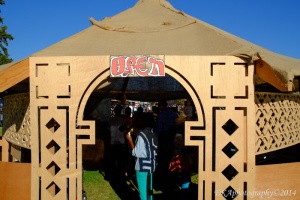Africa and Oakland have always had an interesting relationship. Well, at least for the better part of 80 years. While there’s been a notable African American population in Oakland since the ‘30s—the initial settlers were likely survivors of the Great Flood of 1927 and/or the Great Depression, and in the post-WWII years, the city’s black population swelled by 300%, eventually comprising a demographic majority —Oakland’s African population were later arrivals. In the mid-70s, Congolese drummer/dancer Malonga Casquelourd arrived, and helped to establish a vibrant cultural scene based around the then-Alice Arts Center. Ever since then, Oakland has been a welcoming place for natives of the African continent.
Africans have brought culture to Oakland, and lent cultural authenticity to the music and dance forms being practiced at spaces like the Alice Arts Center (renamed in Casquelourd’s honor after his tragic death at the hands of a drunk driver in 2003). But though there are Nigerians, Kenyans, Ethiopians, Eritreans, Zimbabweans, Senegalese, Ghanaians, Malians and many other African nationalities currently residing in Oakland, in many cases, the notion of pan-Africanism is more of an ideological ideal than a societal reality. In Oakulture’s experience, most ethnic Africans tend to socialize with people from their home countries, and even within those countries, tribal strife or class divisions from the motherland sometimes surfaces, making African social circles somewhat cliqueish.
That’s why two recent events which brought Oakland’s African Diaspora together were so significant.
Without overtly espousing a Pan-African agenda, both accelerated that concept. The first event, the Umoja Festival, transformed West Oakland’s underutilized Lowell Park into a vibrant cross-cultural exchange, with live music, DJs, a soccer tournament, merchant booths, and more. Performances by Afrolicious vocalist Fresh is Life and a full band concert by the Lagos Roots Afrobeat Ensemble livened up the proceedings, but it was already a sunny, pleasant day to begin with.
Now in its second year, the Umoja Festival has become yet another feather in Oakland’s cultural diversity cap. The event brought out Africans of all nationalities, underlining its theme of cultural unity, as well as a few hundred multicultural Oaklanders. It was gratifying to see the growth from the inaugural event; this year’s crowd was easily several times that of last year’s, and next year’s should be bigger still and even more organized.
The second event was the Home Away From Home festival. That was a week-long celebration of African—mainly Ethiopian/Eritrean—culture which coincided with Ethiopian New Year festivities, and touched on music, art, dance, hair-braiding as sculpture, and coffee, which culminated in a daylong concert at Lake Merritt. Event organizers, which included vocalist and TED Global Fellow Meklit Hadero, kept talking about how they were making history, and indeed, such inclusive celebrations of East African culture aren’t at all commonplace in the motherland. Political conflict in particular has prevented the now-separatist Eritreans from coming together with Ethiopians, even though there exists thousands of years of shared history between the two regions. So, to say Home Away From Home was unprecedented is a bit of an understatement.
The stage at the festival, held at Lakeshore Park near Lake Merritt, was entirely pedal-powered, courtesy of Rock the Bike . Rows of bicycles connected to electrical generators had been set up at either side of the stage, and powering the sound became a fun activity for all the kids in attendance (and quite a few adults). It was cool to see all the Ethiopians and Eritreans, which are a quite plentiful community in Oakland but not usually visible in such numbers, dancing to the music with the traditional shoulder-shrug motion. All told, there were also several hundred people in attendance for the event, which was part of the “Love the Lake” festivities which encouraged people to enjoy Lake Merritt.
To emphasize the placemaking theme, organizers constructed a traditional thatched hut, or tukul, which contained artwork done by Ethiopian artists. The musical highlight of “Home” had to be the traditional Ethiopian/Tigray music performed by Ytbarek Kahsay, who played both the electric krar—a five-string lyre tuned to the pentatonic scale—and the masenko, a single-stringed lute, played with a bow like a violin.
Kahsay, an azmari, or traditional Abyssinian minstrel, was absolutely mesmerizing to watch, partially because he accompanied himself while singing, but also because the repetitive melodic tones he played seemed to vibrate with hypnotic resonance. It’s not often that non-Ethiopians have a chance to even hear such wondrous instruments played live, and Kahsay’s notes carried clear across the meadow, all the way to Grand Ave.
So, what does this upsurge in African culture mean? Well, while the declining number of Oakland’s African Americans has been a concern for those who appreciate the city’s diversity, festivals like Umoja and Home Away From Home suggest the local African expats are not only staying put and putting down roots here (which stretch as far as 8,000 miles across the ocean), but their numbers may actually be growing. That’s good news for those who love African culture and all its offshoots—music, dance, food, fashion—and helps give credence to the notion that Oakland is not just a multicultural city, but an international one.








Pingback: 2014: The Year in Oakulture | oakulture
Pingback: Women Runnin It: Interview with Effie Tesfahun | Oakulture
July 15, 2019 at 4:36 am
Nice culture vibes
LikeLike